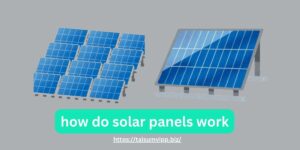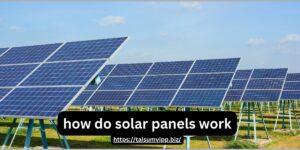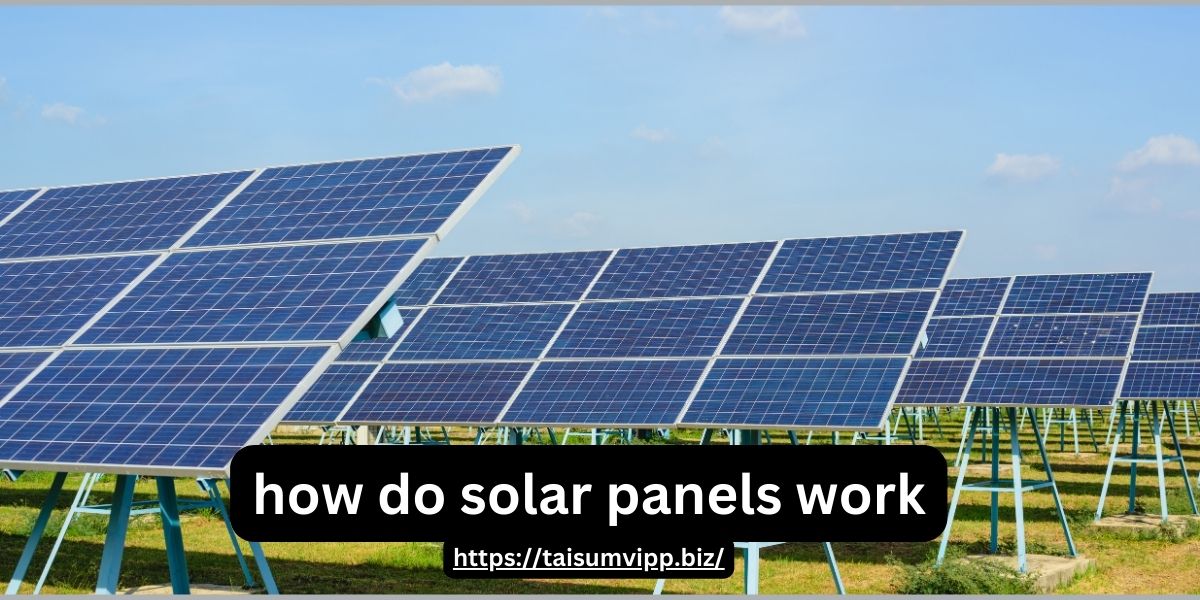Solar panels are a fascinating technology that harnesses the power of the sun to generate electricity. Understanding how solar panels work can help us appreciate their importance in renewable energy systems. In this article, we will explore various aspects of solar panel operation, from their functionality during different times of the day to their impact on electricity bills. Additionally, we will address common questions about their performance in adverse weather conditions and explore the different types of solar panels available. So let’s dive in and unlock the secrets behind the remarkable functioning of solar panels.
how do solar panels work on a house
Solar panels on a house operate by capturing sunlight and converting it into usable electricity. This process primarily depends on the photovoltaic effect. Solar panels consist of photovoltaic (PV) cells made of semiconductor materials, such as silicon. When sunlight hits these cells, it excites the electrons, allowing them to flow freely and generate an electric current.
The direct current (DC) electricity produced by the solar panels needs to be converted into alternating current (AC) for standard household use. This conversion is accomplished by an inverter, which ensures that the electricity from the solar panels aligns with the requirements of your appliances.
It’s important to note that the angle and orientation of the solar panels on a house can significantly impact their efficiency. Ideally, solar panels should be installed facing south in the northern hemisphere and north in the southern hemisphere to receive the maximum amount of sunlight throughout the day. Additionally, the tilt of the panels should be adjusted according to the latitude of the location to optimize sunlight absorption.

Another crucial component of a solar panel system on a house is the net meter. A net meter allows homeowners to track the amount of electricity their solar panels generate and how much excess electricity is sent back to the grid. This enables homeowners to receive credits or compensation for the surplus energy they contribute, promoting sustainability and cost-effectiveness in the long run.
how do solar panels work at night
At night, when the sun is not shining, solar panels do not generate electricity. Since solar panels depend on sunlight to generate a flow of electrons, the absence of sunlight renders them inactive. However, this does not mean your home is left without power during nighttime. Most residential solar panel systems are connected to the grid. This allows homeowners to draw electricity from the power company’s supply when their panels are not producing electricity.
It’s fascinating to note that some advanced solar panel systems come equipped with energy storage solutions such as batteries. These batteries store excess electricity generated during the day, which can then be used to power your home at night or during cloudy weather. This innovative technology ensures a more consistent and reliable power supply, reducing dependence on the grid and increasing self-sufficiency.
Moreover, during the night, solar panels can still play a role in energy production indirectly. Moonlight, although significantly dimmer than sunlight, can still be converted into electricity by solar panels. While the energy generated from moonlight is minimal compared to sunlight, it showcases the adaptability and potential of solar technology to harness various sources of light for power generation.
how do solar panels work for kids
Explaining the concept of solar panel operation to kids requires a simplified approach. Solar panels work by absorbing sunlight, which then causes an electric current to flow. This current can power various devices, from small toys to entire houses. It’s like using the sun’s energy as a superpower to create electricity.
Imagine a solar panel as a superhero that can convert sunlight into energy. When sunlight hits the solar panels, it excites the electrons inside them, making them move and creating an electric current. This current is then captured and directed to power different things around us. So, in a way, solar panels are like magic wands that turn sunlight into usable energy!
Furthermore, solar panels are made up of many smaller units called solar cells. These cells work together to capture and convert sunlight into electricity. Each cell is like a tiny worker bee, contributing its share to harness the power of the sun. So, when you see a solar panel, remember that it’s not just one piece but a team of cells working together to bring clean and renewable energy to our world.
how do solar panels work in the winter
Winter weather affects solar panels differently. Although colder temperatures can improve their overall efficiency, snow and ice accumulation can hinder their performance. When covered in snow, solar panels cannot effectively absorb sunlight. However, solar panels are designed to have a slight tilt, allowing accumulated snow to slide off and expose the surface to sunlight.
In addition, solar panels generate electricity from sunlight, not heat. Therefore, even in cold winter conditions, solar panels can still produce electricity as long as there is sunlight available.
how do the solar panels work in sims 4
In the popular simulation game, The Sims 4, solar panels behave similarly to real-life solar panels. Players can install solar panels on their virtual houses to reduce their in-game electricity bills. Once installed, the panels generate electricity during the day and can power various objects, such as lights and electronic devices. This feature adds a realistic and eco-friendly aspect to the game, empowering players to make sustainable choices within the virtual world.
how do the solar panels work in bloxburg
In the online game Bloxburg, solar panels function as an alternative power source for players’ virtual homes. Similar to real-life solar panels, they generate electricity by harnessing sunlight. Players can install solar panels on the roofs of their Bloxburg homes to reduce their reliance on other forms of energy. This virtual representation of solar panels helps raise awareness about sustainable energy practices among players.
how do solar panels work with your electric bill
Solar panels can significantly impact your electric bill. When your solar panels produce more electricity than you consume, the excess energy can be fed back into the grid. This process is known as net metering. Net metering enables you to earn credits for the surplus electricity you generate, reducing your overall electric bill. However, during periods when your panels don’t produce enough electricity, you may still draw power from the grid and incur charges accordingly.
how do solar panels work with the grid
A grid-connected solar panel system works by allowing seamless two-way interaction between your solar panels and the electrical grid. During the day, when your solar panels produce excess electricity, the surplus is fed into the grid. In return, you receive credits or compensation for the energy you contribute to the grid. At night or when your panels are not generating enough electricity, you can draw power from the grid as needed.
How do solar panels actually work?
Now that we have covered the basics, let’s delve into the intricate workings of solar panels. As mentioned earlier, solar panels contain PV cells. These cells are responsible for converting sunlight into electrical energy using the photovoltaic effect. The most common type of PV cell is made of silicon, which is a semiconductor material.
When sunlight strikes the PV cells, photons (light particles) transfer their energy to the electrons in the silicon atoms, freeing them from their atomic bonds. This creates a flow of electrons capable of generating direct current (DC) electricity. The inverter then converts this DC electricity into alternating current (AC) electricity, suitable for powering your home.
Do solar panels work in rain?
Contrary to popular belief, solar panels can still generate electricity under rainy conditions. Although rain does reduce the amount of sunlight reaching the panels, it does not render them completely nonfunctional. The PV cells in solar panels can still convert the available light into electricity, albeit at a lower efficiency compared to sunny conditions.
Moreover, rain can have some positive effects on solar panels. Rainwater helps wash away dust and debris that may accumulate on the panels, ultimately enhancing their overall performance.
What are the 3 types of solar panels?
There are three main types of solar panels: monocrystalline, polycrystalline, and thin-film. Each type has its own advantages and characteristics.
- Monocrystalline solar panels: These panels are made from a single crystal structure, resulting in high efficiency. They have a uniform black appearance and are ideal for installations with limited space.
- Polycrystalline solar panels: These panels are formed from multiple silicon crystals, giving them a blueish hue. They offer good efficiency and are more budget-friendly compared to monocrystalline panels.
- Thin-film solar panels: These panels consist of a thin layer of photovoltaic material applied to a solid surface, such as glass or metal. They are flexible and lightweight, making them suitable for certain applications, such as building-integrated solar panels.
At what temperature do solar panels stop working?
Solar panels can withstand various temperatures, but their efficiency decreases as the temperature rises. Typically, solar panels work most efficiently at lower temperatures. Once the ambient temperature exceeds around 77°F (25°C), the efficiency of solar panels starts to decline gradually.

However, it’s worth noting that the reduced efficiency caused by high temperatures does not mean solar panels stop working completely. They can still generate electricity, albeit at a slightly reduced output.
Conclusion
Solar panels are a remarkable technology that harnesses the power of the sun to produce clean, renewable energy. By understanding how solar panels work, we can appreciate their role in generating electricity for homes and various applications. Whether they’re providing power during the day, contributing to grid interactions, or operating in adverse weather conditions, solar panels continue to play a vital role in our transition towards a more sustainable future.
